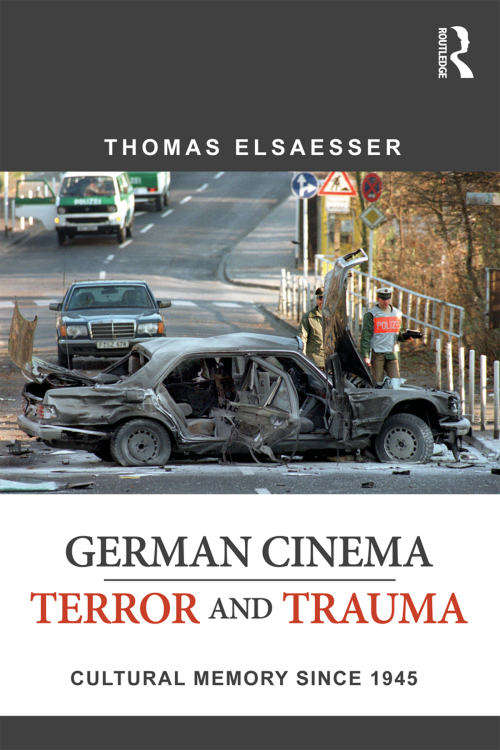In German Cinema: Terror and Trauma – Cultural Memory Since 1945 Thomas Elsaesser re-evaluates the meaning of the Holocaust for postwar German films and culture, while offering a reconsideration of trauma theory today. Elsaesser argues that Germany's attempts at "mastering the past" can be seen as both a failure and an achievement, making it appropriate to speak of an ongoing 'guilt management' that includes not only Germany, but Europe as a whole.
In a series of case studies, which consider the work of Konrad Wolf, Alexander Kluge, Rainer Werner Fassbinder, Herbert Achternbusch and Harun Farocki, as well as films made in the new century, Elsaesser tracks the different ways the Holocaust is present in German cinema from the 1950s onwards, even when it is absent, or referenced in oblique and hyperbolic ways.
Its most emphatically "absent presence" might turn out to be the compulsive afterlife of the Red Army Faction, whose acts of terror in the 1970s were a response to – as well as a reminder of – Nazism’s hold on the national imaginary.
Since the end of the Cold War and 9/11, the terms of the debate around terror and trauma have shifted also in Germany, where generational memory now distributes the roles of historical agency and accountability differently. Against the background of universalized victimhood, a cinema of commemoration has, if anything, confirmed the violence that the past continues to exert on the present, in the form of missed encounters, retroactive causal chains, unintended slippages and uncanny parallels, which Elsaesser – reviving the full meaning of Freud’s Fehlleistung – calls the parapractic performativity of cultural memory.
Contents
Part I – Terror, Trauma, Parapraxis
1. Terror and Trauma: Siamese Twins of the Political Discourse
Thomas Elsaesser
2. Memory Frames and Witnessing: Burdens of Representation and Holocaust Films
Thomas Elsaesser
3. The Politics and Poetics of Parapraxis: On Some Problems of Representation in the New German Cinema
Thomas Elsaesser
4. Generational Memory: The RAF Afterlife in the New Century
Thomas Elsaesser
Part II – Parapractic Poetics in German Films and Cinema
5. Rescued in Vain: Parapraxis and Deferred Action in Konrad Wolf’s Stars
Thomas Elsaesser
6. The Persistent Resistance of Alexander Kluge
Thomas Elsaesser
7. Retroactive Causality and the Present: Fassbinder’s The Third Generation
Thomas Elsaesser
8. Mourning as Mimicry and Masquerade: Herbert Achternbusch’s The Last Hole
Thomas Elsaesser
9. Rewind after Replay and Postponement in Harun Farocki’s Respite
Thomas Elsaesser
Part III – Trauma Theory Reconsidered
